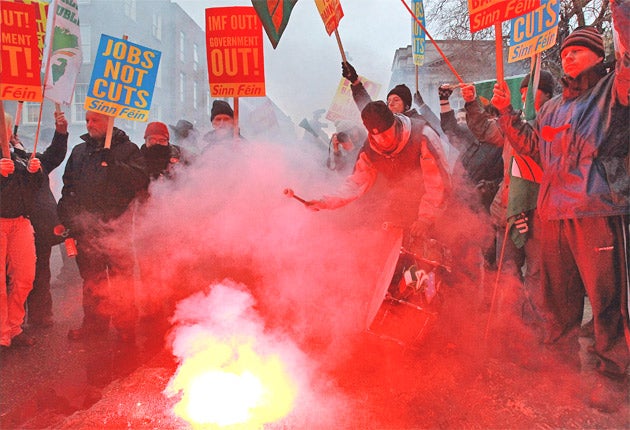More misery for Ireland as brutal cuts revealed

Your support helps us to tell the story
From reproductive rights to climate change to Big Tech, The Independent is on the ground when the story is developing. Whether it's investigating the financials of Elon Musk's pro-Trump PAC or producing our latest documentary, 'The A Word', which shines a light on the American women fighting for reproductive rights, we know how important it is to parse out the facts from the messaging.
At such a critical moment in US history, we need reporters on the ground. Your donation allows us to keep sending journalists to speak to both sides of the story.
The Independent is trusted by Americans across the entire political spectrum. And unlike many other quality news outlets, we choose not to lock Americans out of our reporting and analysis with paywalls. We believe quality journalism should be available to everyone, paid for by those who can afford it.
Your support makes all the difference.As a freezing rain fell on Dublin, the Irish government unveiled the most brutal step yet in its austerity drive: a budget of unprecedented severity that will save €6bn (£5bn) through drastic spending cuts and tax rises for hundreds of thousands of people.
Finance Minister Brian Lenihan told the Irish parliament that it had been a "traumatic and worrying time for the citizens of our country". But to the jeers of the opposition, and with hundreds of protesters gathered at the gates of the parliament to protest against the cuts, he insisted that the fourth swingeing austerity budget in a row would bring a new era with it. "Recovery in the real economy is beginning to take shape," he said, adding that there were "clear signs of hope".
But few were convinced by that cheerful prediction. "I'm afraid for the future, I'm afraid for the country and everyone around me," Maeve, a 62-year-old retiree who will be hit by tax rises, a loss of tax credits and a new pension levy, told Reuters. "I look at the misery and wonder what will happen to this country."
Among the most painful measures announced were cutbacks of around five per cent in social welfare benefits, including child benefit. Jobseekers allowance will also be reduced. Many more workers will be brought into the tax net while various other taxes and levies are to be raised.
As a gesture to angry public opinion, the government announced salary cuts for the Prime Minister, ministers and others in the public sector, where salaries from now on must not exceed €250,000.
Ministers spoke of "these dark times" while an opposition spokesman declared: "We went bust."
A series of votes in the Dail, the Irish parliament, will be needed to give effect to the budget. Last night the government won the first of the votes by 82 - 78, which given its wafer-thin majority was regarded as a comfortable victory. Later it won a second vote on tax increases by 82 votes to 79.
While such tough measures would normally be expected to produce political and perhaps social uproar, the prevailing mood in the Republic has recently been one of resignation, most accepting the country is in dire straits.
The harsh budget was already in prospect as the Republic's credit ratings plummeted, with the two largest political parties agreeing that major cutbacks were needed. But it became absolutely inevitable when the government, after several fraught weeks and a period of vainly insisting that all was well, admitted it was in deep trouble and sought a bail-out from the International Monetary Fund and EU.
This was finally unveiled last month when the outside agencies agreed to provide a €85bn rescue package. This brought some emergency relief, because money is now available at much lower interest rates than Ireland could have got on the international money markets.
But the package came at the price of strict IMF supervision, with the government required to stick to a four-year plan to bring its deficit below three per cent of gross domestic product through saving a total of €15bn.
This means yesterday's budget is the toughest but not the last in a series of measures which will inevitably reduce living standards in the hope of delivering eventual recovery.
The economic crisis has gone hand in hand with political upheaval. The administration has been regarded as doomed since last month, when the Green party announced that it would withdraw early next year.
In the wake of this, Prime Minister Brian Cowen conceded that a general election would be held once the budget's measures are fully enacted. Polling is expected to take place in either February or March. Most Irish voters hold his party Fianna Fail in low regard, with a recent opinion poll registering support for the party at a record low of only 13 per cent. Mr Cowen's personal showing was a dismal 8 per cent.
This may mean that something close to meltdown lies ahead for what has traditionally been Ireland's largest party, but even if it recovers somewhat it is given no chance of retaining office. It is expected to be succeeded by a coalition of the two other big parties, Fine Gael and Labour.
Join our commenting forum
Join thought-provoking conversations, follow other Independent readers and see their replies
Comments